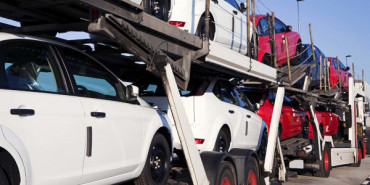Cost of transporting a car from state to state

In this article, we will look at the main points that affect the cost of transporting a car from state to state and in the country as a whole. On the world wide web most potential customers of transportation services try to find deals on the request "How much does it cost to transport a car across the country?". In this search you can find different offers of car shipping services with different rates of transport companies, sometimes very similar, and some with a big difference in prices. If a car owner spends time studying the situation and prices on the road transport market, he will be able to understand the services offered more quickly and make the right decision without stress and possible mistakes.
Learn how the cost of transporting a car from state to state can impact your budget, and explore Photography Equipment to document every step of your journey with professional-quality shots & gear.
We should list seven main points that affect the cost of such transportation:
1) Transport distance.
Clearly, this is the distance that has a significant impact on transportation prices, because the further you have to go, the more expenses will be along the way. Nevertheless, regardless of the distance, the cost of loading and unloading a vehicle will be approximately the same.
2) Use of open and enclosed shipments.
Delivery in an open trailer and on a truck platform is known to cost 40% less than travel in an enclosed way. With open transport, more vehicles can be delivered, and accordingly the operating costs can be divided among some voyage participants. Open trailers can hold up to 10 cars, while closed trailers can hold no more than six, although usually do not carry over 2 or 3 units.
In addition to the difference in the ordinary cost of open and enclosed transport, delivery prices differ according to the carrier's insurance. With open trailer carriage, the insurance coverage reaches about $250,000, and for closed delivery up to one million dollars, as expensive vintage and sports vehicles are delivered in this case for their better protection.
3) The working condition of a transported vehicle.
Typically, a car drives on its own on a truck platform or trailer. However, if the vehicle does not work, it takes more time and effort to place it into the truck’s trailer. Usually winches or a forklift are required for loading and unloading, and usually drivers do not have such equipment with them. Therefore, transport car from state to state cost for such non-working vehicles will be much higher than usual. The customer must order a forklift separately at the departure and delivery points to unload his immobilized vehicle.
In most cases, the shipping company's surcharge for a non-working vehicle is around $150. When a freight rate is offered, trucking companies are also asked to indicate the operating condition of the machine. When a customer is offered a surcharge of more than $150 for a non-working car, be sure to explain why such a surcharge is, or contact another service provider.
4) A type of car for transportation.
For tractor-trailer trucks, the law imposes restrictions on the weight of the transported cargo, taking into account the availability of equipment. For example, if a Ford F-350 weighing 7,000 pounds had to be delivered, the transport car to another state cost would be twice as expensive as a car weighing 3,500 pounds. Usually the carrier tries to fully load the truck to get the maximum profit from the transportation. When the machine is lifted and lowered on the tractor platform, additional space is required and this can increase shipping costs.
Every time you order the transport of your car, it is very important to inform the transport agent all the information about it to avoid misunderstandings during loading. For example, if you do not notify the carrier that you have a sports utility vehicle with a reinforced buffer, and there is not enough space in the truck to transport it, then the carrier will not load such a car, which leaves the customer with no choice.
5) Difficult transport route.
 During a voyage, the amount of payment must correspond to the travel time. That is, when driving on a busy highway, the delivery cost is usually cheaper, as the driver does not have to move off the paved road to deliver the load to a secluded town. Transportation between large cities on a direct highway will therefore be significantly cheaper than traveling on a narrow, winding country road. Typically, drivers reluctantly agree to move off the main road to unknown places for pick-up and drop-off, as such a ride takes a long time and increases fuel consumption. When it becomes possible to make a load in a big city or on the outskirts of the state, you can get a good discount from the carrier on transporting cars from state to state cost.
During a voyage, the amount of payment must correspond to the travel time. That is, when driving on a busy highway, the delivery cost is usually cheaper, as the driver does not have to move off the paved road to deliver the load to a secluded town. Transportation between large cities on a direct highway will therefore be significantly cheaper than traveling on a narrow, winding country road. Typically, drivers reluctantly agree to move off the main road to unknown places for pick-up and drop-off, as such a ride takes a long time and increases fuel consumption. When it becomes possible to make a load in a big city or on the outskirts of the state, you can get a good discount from the carrier on transporting cars from state to state cost.
6) Importance of a shipping season.
The field of road carriages is closely intertwined with logistics and its rules. As elsewhere, the price and time of moving are strongly influenced by supply and demand in the transporting services market. The carrying capacity in a truck depends on the vehicles being transported at a particular time. If few cars are delivered along one route, many carriers will not pay special attention to it. In the case of an increase in traffic intensity on a certain route, the shipping cost on it grows up. For example, at the end of the fall, the transportation route from Florida to New Jersey will cost about $450, while the return trip will cost about $800, due to the increase in traffic heading south toward winter. So the same route can cost differently depending on the direction and seasonality.
7) Efficiency in loading and unloading vehicles.
To receive your car as soon as possible by a certain date, express transporting may become the best solution. But this method is at 30 to 40% more expensive than usual picking up and delivery, and this car is taken for transportation in the first place.
It is only important in the form of a document to agree with the trucking company on the condition of repaying the overpayment for expedited delivery if the carrier does not meet the arrival time of the car at the destination. The broker then pays back the difference in price between expedited and regular shipping.
Discover the most competitive rates for car transportation. Navigate through the top car auction and unveil cost-effective options to seamlessly transport your vehicle with reliability and efficiency.
Reasons for the difference in transporting a car from state to state cost.
Various companies usually have different rates for delivering cars along the same route. The reasons for this differ for each company, for example the quality of the provision of transport services by the relevant carrier for the car delivery. If a carrier performs deliveries at a lower cost than many other forwarders, he may not have some proven and reliable equipment available, and his insurance is no longer valid. Proven brokerage firms with extensive experience always look to the carriers they hire for licenses, warranties, and insurance to ensure reliable transportation of all vehicles. A transport brokerage firm often earns revenue in the form of increased commissions that work with larger shipments, as opposed to a single broker alone.
Small forwarding companies are often unable to provide insurance coverage for the carrier in the event of unforeseen situations, while experienced companies can provide a free service to support their customers in the amount of $100,000 in case of an insured event. This usually happens when the carrier fails to meet its obligations. In such a situation, such insurance gives the customer confidence in the successful completion of the whole process.
